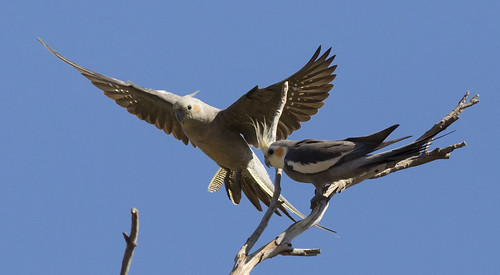 What makes a harmonious pair of Cockatiels? Image by Jim Bendon.Transylvania University biology professor Becky Fox came up with a sort of “eHarmony for parrots” when she discovered how cockatiels’ personality types predicted long-term compatibility. She’ll share the results in an upcoming issue of the journal Zoo Biology. “It’s my hope that some zoos that are managing birds in captivity might find this kind of thing useful,” Fox said.
What makes a harmonious pair of Cockatiels? Image by Jim Bendon.Transylvania University biology professor Becky Fox came up with a sort of “eHarmony for parrots” when she discovered how cockatiels’ personality types predicted long-term compatibility. She’ll share the results in an upcoming issue of the journal Zoo Biology. “It’s my hope that some zoos that are managing birds in captivity might find this kind of thing useful,” Fox said.
If there were a Valentine’s Day for cockatiels, these findings would offer hope to any of the small, crested Australian parrots who are, shall we say, hawkish.The paper is based on data she collected in graduate school about a colony of captive cockatiels that have called the University of California, Davis, home since the 1970s. Observers, mostly undergrads, rated birds on personality traits and waited to see who they paired with. Then the researchers watched the birds for things such as how much they fought with their “spouses” (the species can form lasting relationships), whether they managed to hatch eggs and how well they coordinated incubating.
Unsurprisingly, the survey showed birds that got along better were more skilled at coordinating behavior and raising chicks. But did this have to do with how well the personalities of these popular pets meshed? You bet.
 Transylvania University biology professor Becky FoxTurns out, birds of a feather don’t seem to flock together. Specifically, two aggressive birds — ones that will race across the aviary to knock another off a favorite food dish — aren’t a match made in heaven. And, for whatever reason, two agreeable birds didn’t do so hot either.
Transylvania University biology professor Becky FoxTurns out, birds of a feather don’t seem to flock together. Specifically, two aggressive birds — ones that will race across the aviary to knock another off a favorite food dish — aren’t a match made in heaven. And, for whatever reason, two agreeable birds didn’t do so hot either.
But match up a disagreeable cockatiel with a nice one and you get a couple of love birds. “In that case, opposites are what work really well,” Fox said.
She co-authored the paper — titled “Personality traits of pair members predict pair compatibility and reproductive success in a socially monogamous parrot breeding in captivity” — with J.R Millam, professor emeritus of animal science at UC Davis.